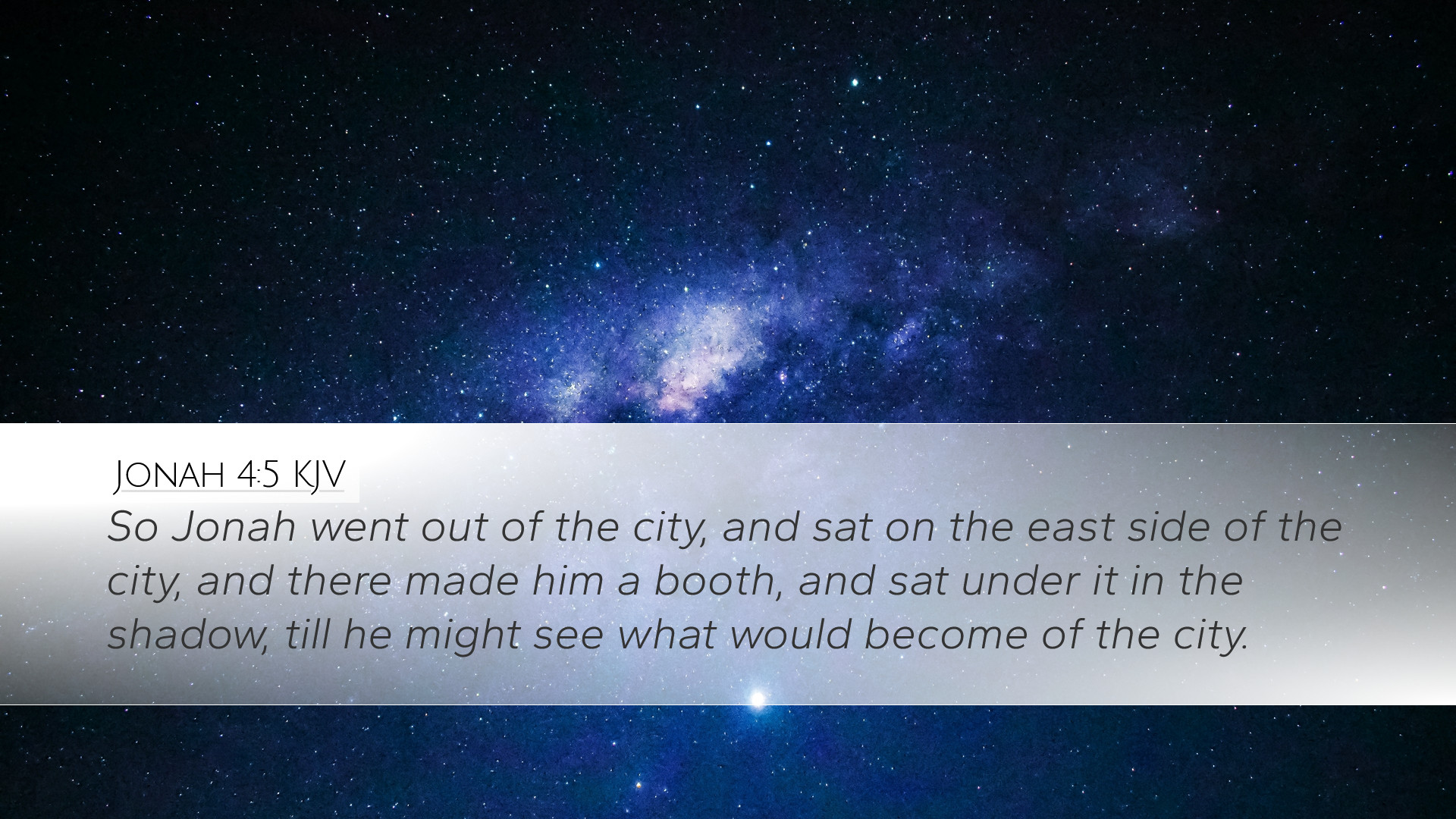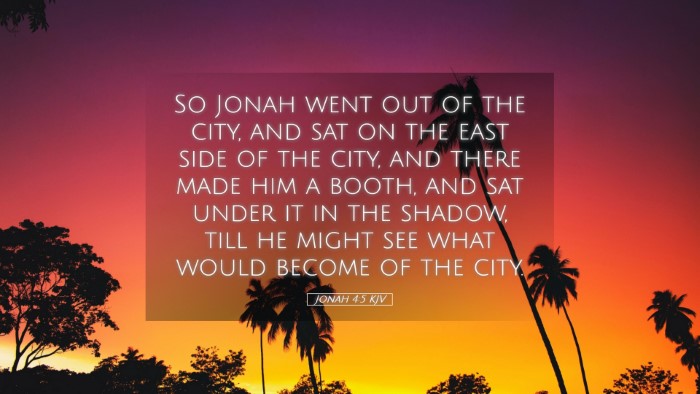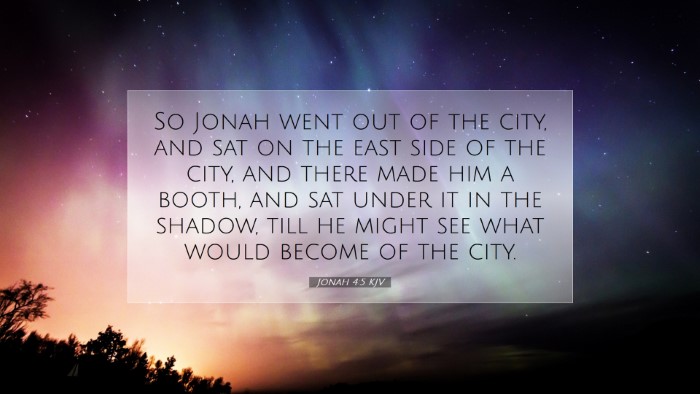Old Testament
Genesis Exodus Leviticus Numbers Deuteronomy Joshua Judges Ruth 1 Samuel 2 Samuel 1 Kings 2 Kings 1 Chronicles 2 Chronicles Ezra Nehemiah Esther Job Psalms Proverbs Ecclesiastes Song of Solomon Isaiah Jeremiah Lamentations Ezekiel Daniel Hosea Joel Amos Obadiah Jonah Micah Nahum Habakkuk Zephaniah Haggai Zechariah MalachiJonah 4:5
Jonah 4:5 KJV
So Jonah went out of the city, and sat on the east side of the city, and there made him a booth, and sat under it in the shadow, till he might see what would become of the city.
Jonah 4:5 Bible Commentary
Commentary on Jonah 4:5
Jonah 4:5 states:
“So Jonah went out of the city and sat on the east side of the city. There he made himself a shelter and sat under it in the shade, till he might see what would become of the city.”
Introduction
This short verse encapsulates a critical moment in Jonah's narrative, marking his emotional state and the physical actions that illustrate his attitude toward God's mercy. In understanding the depth of this passage, we explore the insights offered by Matthew Henry, Albert Barnes, and Adam Clarke, each of whom reflects on Jonah's character, the nature of his actions, and the broader implications of God's mercy.
Contextual Analysis
Jonah, having been sent to preach repentance to the city of Nineveh, experiences a profound transformation as the inhabitants accept his message. However, Jonah does not share in the joy of their repentance. Instead, he retreats, revealing a complex interplay between his prophetic duty and personal grievances against God's compassion.
Matthew Henry's Insights
Matthew Henry emphasizes Jonah's self-exile as indicative of his inner turmoil. He notes:
- The East Side of the City: Jonah chooses to position himself east of Nineveh, a location that perhaps symbolizes a separation from the people he was sent to save.
- His Shelter: The construction of a booth suggests an attempt to shield himself from the harsh realities of his disappointment in God’s mercy towards Nineveh.
- Watching From Afar: Henry observes that Jonah's desire to "see what would become of the city" reveals a lingering hope for its destruction. This underscores his unwillingness to accept God's graciousness.
Albert Barnes' Commentary
Albert Barnes provides a more theological reflection on this passage, reflecting on Jonah’s actions in light of divine providence:
- Jonah's Anger: Barnes suggests that Jonah's journey away from the city and his subsequent actions stem from deep-seated anger at God's decision to spare Nineveh.
- God's Purpose: Barnes argues that God allows Jonah to witness this moment to teach him about His greatness and the universality of mercy. Jonah's sheltering under a booth paralleled the shelter God wished to extend to all humanity.
- Theological Implications: The commentator highlights the necessity of divine grace that reaches beyond cultural and moral boundaries, serving as a reminder to all believers to embrace compassion.
Adam Clarke's Interpretation
Adam Clarke’s insights revolve around the emotional and spiritual learning curves Jonah encounters:
- Jonah's Discontent: Clarke posits that Jonah's distress influences his decision to isolate himself from the blessings he initially anticipated. His actions reveal a disconnect between divine purpose and personal expectation.
- The Shelter Reflects Spiritual State: Clarke points out that the shelter represents Jonah’s superficial understanding of protection and shade, contrasting it with the encompassing mercy of God, which he rejects.
- Observing God’s Work: The act of waiting to see Nineveh’s fate illustrates a lack of maturity in understanding God’s nature; Jonah desires retribution rather than restoration.
Theological Reflections
This passage draws multiple theological themes worthy of deeper reflection:
- Human Resentment vs. Divine Mercy: Jonah's actions signify the struggle between human desires for justice and God's overwhelming mercy.
- Prophetic Responsibility: The silence of Jonah after Nineveh's repentance serves as a critique of prophetic integrity and the challenges prophets face when their expectations of God diverge from reality.
- Isolation vs. Community: Jonah’s physical distancing highlights a spiritual malaise that many believers face when struggling with understanding God's ways and His dealings with others.
Conclusion
In Jonah 4:5, we witness a profound truth about the human condition mirrored in Jonah's actions. The insights from Matthew Henry, Albert Barnes, and Adam Clarke combine to provide a rich tapestry of meaning. For pastors, students, theologians, and scholars, the verse serves as both a cautionary tale and an invitation to reflect on our attitudes toward God's mercy, the communal implications of our faith, and the often-difficult journey of aligning our hearts with God's universal purpose.


